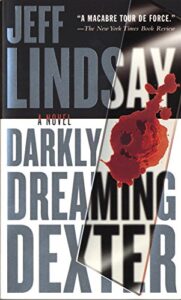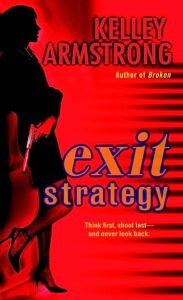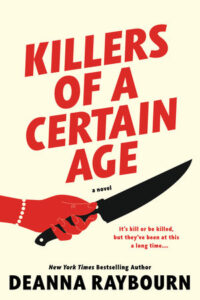Morally ambiguous characters wouldn’t make the best of friends, but they do make for interesting books. So—why is it that readers are often able to root for fictional killers, who violate one of the basic tenets of society: the right to life?
That’s one of the questions I asked myself when I started writing Before She Finds Me, which features Ren Petrovic, a pregnant assassin who targets those she and her husband deem worthy of punishment. Ren was raised into the trade by her father, whose mantra was instilled in her as a child. Shield the innocent. Kill the guilty. Defend the family. Ren’s own mantra is simpler: Do what’s right. But her definition of what’s right differs dramatically from the average reader’s. (One would hope anyway.) In creating the character of Ren, I thought a lot about the fictional contract killers and vigilantes who came before. How do they justify their profession or avocation? And what makes them nevertheless relatable—even if I’m not personally inclined to whip up a batch of cookies made with the poisonous barbados nut.
The why is crucial. Before she kills someone by poisoning them, Ren asks her targets philosophical questions, such as What do you think is more important—intention or outcome? For fictional killers and vigilantes alike, intention matters. Without a compelling reason for their actions—often rooted in traumatic backstory, and often pitting them against a greater evil—it would be harder to recognize, and thus connect with, their humanity. It’s easier to engage with a morally complex character who struggles to make the right choice. (Outcomes matter, too, of course. No one wants to see an animal or innocent harmed. Still, as a reader, I find it easier forgive a bad outcome than evil intent.)
Reading such characters can also be cathartic. Exploring the character of Ren helped in my struggle to make sense of a very complicated world. But also—she was a lot of fun to write. Would I want to share a drink with her? Definitely not, especially if she prepared it. But I’ll always be up for reading stories like hers. The attempts of such characters to do what’s right is relatable, even if these characters do things I would never do.
Here are six books that feature killers with a code.

DARKLY DREAMING DEXTER, Jeff Lindsay
A list like this couldn’t exist without a reference to the influential books that spawned a hit Showtime series. Dexter Morgan is a blood spatter analyst for the Miami police—and also a vigilante serial killer. He operates under a strict code passed down to him by his adoptive father, Harry, who recognized his son’s violent urges. Dexter only targets murderers or violent criminals who slipped through the cracks of the legal system. He also goes out of his way to prove to himself that his targets are guilty of their crimes—though he also often feels a kinship with the killers on his list.

THE GIRL WITH THE DRAGON TATTOO, Stieg Larsson
Asocial hacker Lisbeth Salander was my favorite part of the Millennium Series. Like others on this list, Lisbeth has strong opinions about what constitutes justice, especially when it comes to crimes against women. (Like others on this list, she has the prerequisite tragic and motivating backstory.) Whether in self-defense or retribution, Lisbeth steps right up to the line many times. Does she cross it into murder? No spoilers here, but what makes the reader root for Lisbeth is that she does have a conscience, and the men she targets are guilty of truly horrific acts.

EXIT STRATEGY, Kelley Armstrong
Nadia Stafford was a police officer until a scandal cost her her career. Now, she’s a contract killer working for a Mafia family, using the part-time gig to pay the bills until her wilderness lodge starts making money. The first person she targets is a drug dealer—a bad man who, she believes, has earned his death. Even then, though, her thoughts turn to those who care for him, who don’t deserve their inevitable suffering at his loss. So we know up front she has a conscience. When a serial killer who might be a professional like her starts murdering innocent people, Nadia bands together with a small group of contract killers to uncover the truth before their own secret society is unmasked.

KILLERS OF A CERTAIN AGE, Deanna Raybourn
Readers first meet Billie, Helen, Natalie, and Mary Alice as new recruits of the Museum, a multi-national organization that began by hunting Nazis and now targets war criminals and other really bad people. (Billie, for example, is recruited with this pitch: Haven’t you ever thought to yourself that some people simply need killing to make the world a better place?) As the novel opens, the elite all-female squad is preparing to assassinate their first mark on a plane. How do readers know these four women have “standards”? While they don’t hesitate to kill the man and his entourage, one of them insists on saving a poodle onboard. Forty years later, the four assassins are sent on a free cruise to celebrate their retirement, but they quickly realize they’ve been marked for death by their own organization.

THE INNOCENT, David Baldacci
This novel introduces Will Robie, the guy the U.S. government calls on to eliminate the worst of the worst—enemies of the state, monsters who prey on the weak, and men with more money than morals. Robie is the type to sleep soundly after killing five men, but who turns off his scope when a female target of his surveillance begins to undress. He’s also the type of hitman who has second thoughts when his latest target turns out to be a young mom. After he refuses to pull the trigger, a fleeing Robie crosses paths with a teen runaway. Against all his training, he can’t walk away—especially after learning her parents were killed, and her life, too, is in danger.

HOW I’LL KILL YOU, Ren DeStefano
On first glance, these serial killer triplets—Sissy, Moody, and Iris—might not appear to have a code, at least not one rooted in morality. They have a nasty habit of killing their boyfriends, and the man Sissy has identified for her first kill seems perfectly nice. For this trio, they’re motivated less by the urge to get rid of really bad men (even if their first kill is a married and emotionally abusive lover) and more by sister code. So what happens when Sissy has second thoughts about the life they’ve chosen, and begins to have feelings for her mark? In this family, having a conscience might get you killed.
***


















